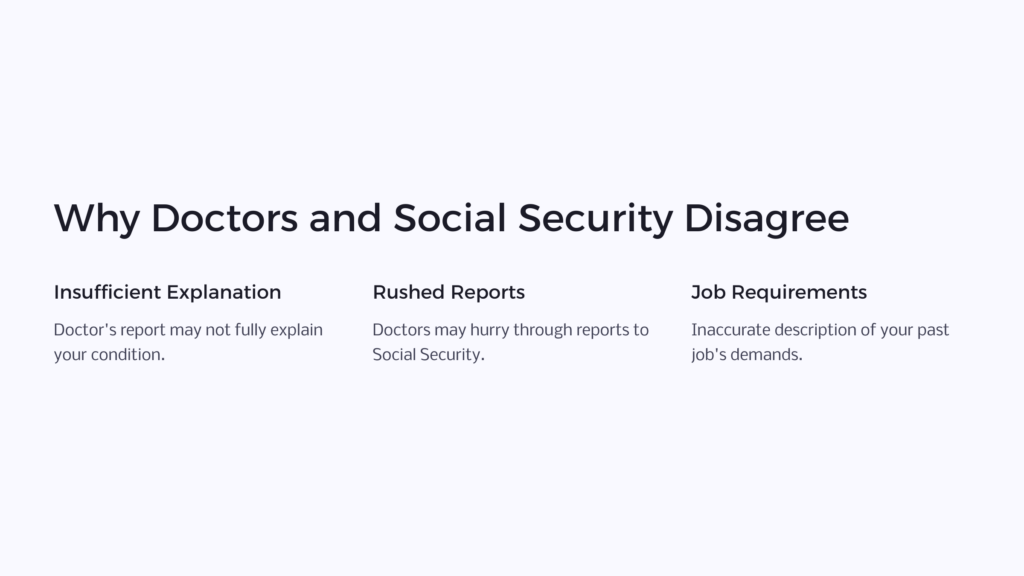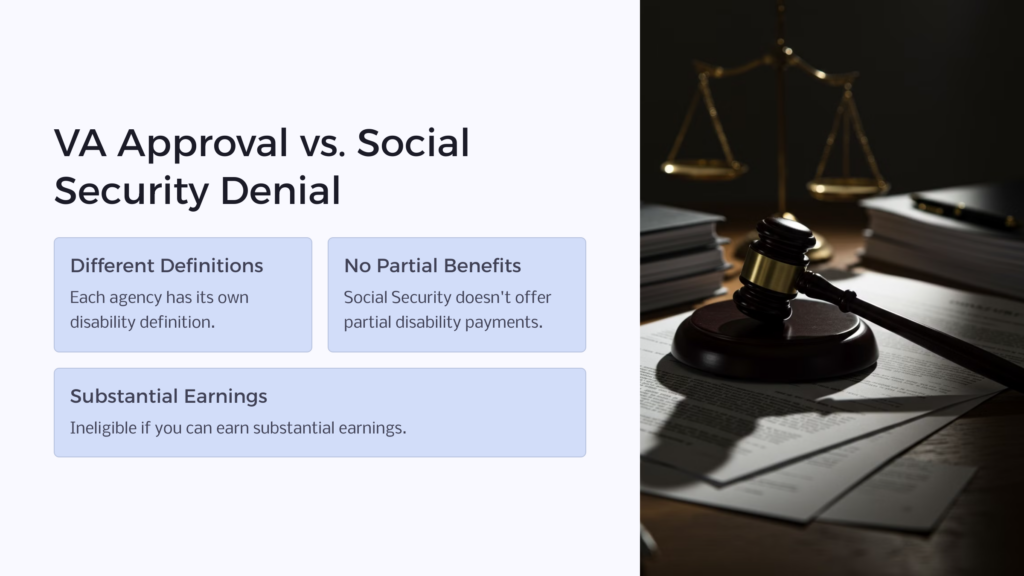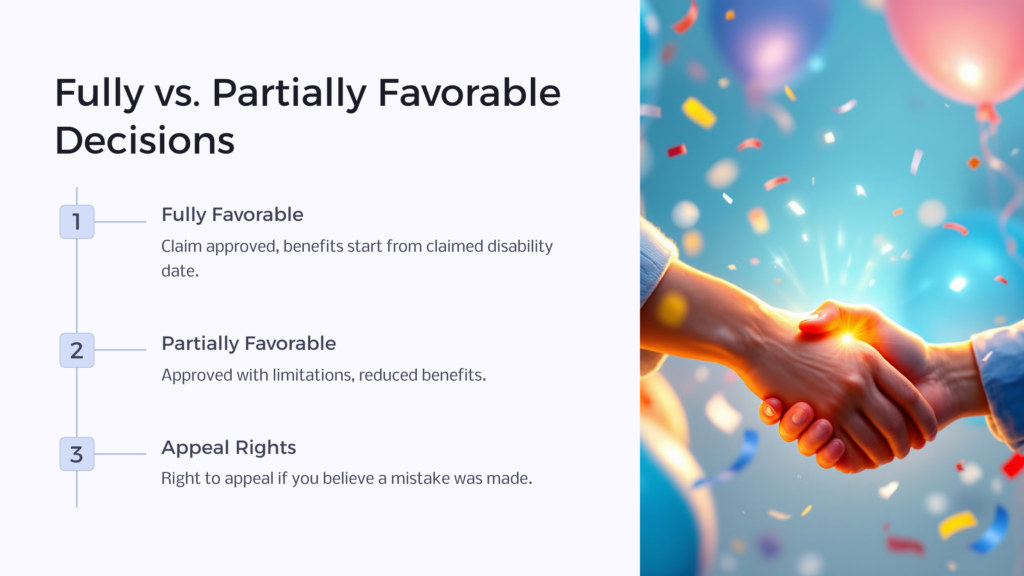My doctor says I am disabled, so why was I denied Social Security disability benefits?
There are several reasons why you could be denied disability by Social Security.
Reasons Why Social Security and Your Doctor Could Disagree

First, there is the chance that you are not disabled as defined by Social Security. “Disability” means different things to different people, even to different medical professionals. When it comes to getting disability payments, the only definition that counts is the one used by the paying organization.
This means that to get Social Security Disability you must meet Social Security’s definition of disability, which is fairly strict. It requires that you be unable to earn “substantial earnings” in any occupation you have done in the past and in any other occupation you could reasonably perform. In 2020, “substantial earnings” for the blind is generally $2,110.00 monthly in gross wages or net self-employment. For all others it is generally $1,260.00. Additionally, to be eligible, your disability has to continue or be expected to continue for twelve months or more.
On the other hand, you may in fact be disabled by Social Security Disability rules. In this circumstance, your claim may have been denied because your doctor did not sufficiently explain your condition and how it affects your ability to work. Many doctors are rushed and hurry through their reports to Social Security. Others are not aware of all the factors they should be explaining or don’t explain them in language that the claims examiner recognizes as meeting Social Security’s criteria.
In some cases, you may not have clearly described all the physical and mental requirements of jobs you have done in the past, so that Social Security thinks your past work was less demanding than it was.
I received a Social Security Disability denial, but the VA says I am disabled

The Many Ways to Define Disability
If you are wondering why the VA has approved you for veterans disability benefits, but you got a Social Security Disability denial, the answer may lie in the fact that every government agency and private insurance company has its own definition of disability. Some of the public agencies are state workers compensation, state or county public assistance programs, Veteran’s Affairs, commonly known as the VA, and the Social Security Administration. Some agencies even have more than one definition of disability, depending on the age of the claimant or other factors.
Social Security Disability Definition
If you are a disabled worker, to be eligible for Social Security Disability, you must meet Social Security’s definition of disability, which is not the same as the VA’s definition. Social Security requires that you be unable to engage in substantial gainful activity in any type of job you have held in the past or, in any other job you can perform. As of 2020, “substantial earnings” is generally defined as $2,110.00 for blind individuals and $1,260.00 for everyone else.
You may have been approved for VA disability and denied Social Security Disability because Social Security does not make partial disability determinations and the VA does. For example, if the VA finds you to be 50% disabled, then they will pay you 50% of the full benefit. In contrast, Social Security does not pay such partial benefits. If you are able to earn substantial earnings, as defined by Social Security, then you are not eligible for benefits even if you have lost 50% of your function.
Appeal Your Social Security Disability Denial
Despite the differences in the two disability programs, if you think that you do qualify under Social Security’s rules and have received a Social Security Disability denial, you should file a disability appeal so that the Social Security Administration receives the appeal within 65 days of the date on the denial letter.
I didn’t get my Social Security Disability denial letter so I missed the appeal deadline. What should I do?
If you discover that you were sent a Social Security Disability denial letter that you didn’t receive, you need to appeal very soon—within a day or two of finding out you were denied.
Appeal the Denial Immediately
Be sure to include a statement with your appeal that says that you didn’t get a denial letter and that describes when and how you found out about the denial. For example, you might have discovered that your claim was denied when you called the Social Security Administration to check on the status of your claim. Also, if you have not moved since you filed your claim or you reported the move, it would be good to mention those facts.
Strategize with a Social Security Lawyer
The next step would be to contact a Social Security attorney right away so that he or she can help make a case for having your appeal accepted. Another advantage of getting a lawyer involved is that if your appeal is rejected as a late filing, the attorney may be able to assist you in filing a new claim in such a manner that it will be accepted for a new disability determination and not denied as a duplicate claim. The attorney can also help you address the reasons for the Social Security disability denial so that your request for appeal, if accepted, or your new claim is successful.
Respond Promptly to the DDS
Dear Benefits Advisor,
My SSI and SSD case has been at the disability determination office for 8 months. Lots of medical records late etc. But I got a call out of blue today from local office saying please call us back promptly. The lady said your caseworker at disability determination wants me to verify your employment dates from 2 years ago. I asked her was I approved she said all I can say is why would they want your work history clarified if it were just a denial. So now when I call the DDS, they say the appeal was sent back to local office but no letter. SSA site says can’t provide information at this time. I have called caseworkers, 800 number, etc. anyone else got that weird phone call?
Carl
Dear Carl,
It is important to provide the dates that you worked because DDS is close to making a decision on your claim. To figure out the correct earliest disability onset date, they have to know how long you worked. If your work earnings were below the substantial gainful activity (SGA) level in those years ($1,070 in 2014 and $1,090 in 2015), also include the most you earned in any of the months.
Once you have provided the information, your appeal will be transferred back to DDS to complete the medical review and give you a decision. An approval is being considered, but your disability onset date and whether you became disabled while still insured cannot be determined and an approval or a denial cannot be finalized until DDS receives the dates.
Sincerely,
Benefits Advisor
What is the difference between a fully favorable and a partially favorable Social Security Disability decision?

A fully favorable Social Security Disability Decision means that your claim has been approved and your benefits will begin based on the date of disability that you claimed and that you will receive ongoing monthly benefits.
A Partially Favorable Social Security Disability Decision
In contrast, a partially favorable decision means that your claim has been approved, but with limitations that will cause you to receive less money than a fully favorable decision would have. There are two situations that result in partially favorable decisions: The decision on your claim might be partially favorable because Social Security determined that you became disabled on a date later than the one you claimed and therefore, your benefits will start later. Or, the decision on your claim might be partially favorable because Social Security has determined that your disability has ended and that you will receive a one-time-only payment.
Consider a Social Security Disability Appeal
If you receive a partially favorable Social Security Disability decision, look at the decision carefully because it is a partial denial. If you believe a mistake has been made, you have the right to appeal. At this point, it would be a good idea to get legal assistance from an attorney who is experienced with Social Security Disability claims. When you appeal, the partial approval of your claim will be reopened, which could result in a full denial rather than a partially favorable approval. That doesn’t happen often, but it is possible and needs to be considered when deciding whether to appeal.
Appealing a Social Security Disability Denial

If you and possibly your doctor believe that you do meet Social Security Disability requirements after being denied disability, then it’s time to appeal. A good Social Security lawyer can talk with your doctor to obtain an appropriate follow-up report and perhaps additional records to support your appeal and/or can assist you in accurately representing your past work or in making any other necessary argument for your appeal.
 Benefits.com Advisors
Benefits.com Advisors
With expertise spanning local, state, and federal benefit programs, our team is dedicated to guiding individuals towards the perfect program tailored to their unique circumstances.
Rise to the top with Peak Benefits!
Join our Peak Benefits Newsletter for the latest news, resources, and offers on all things government benefits.




















